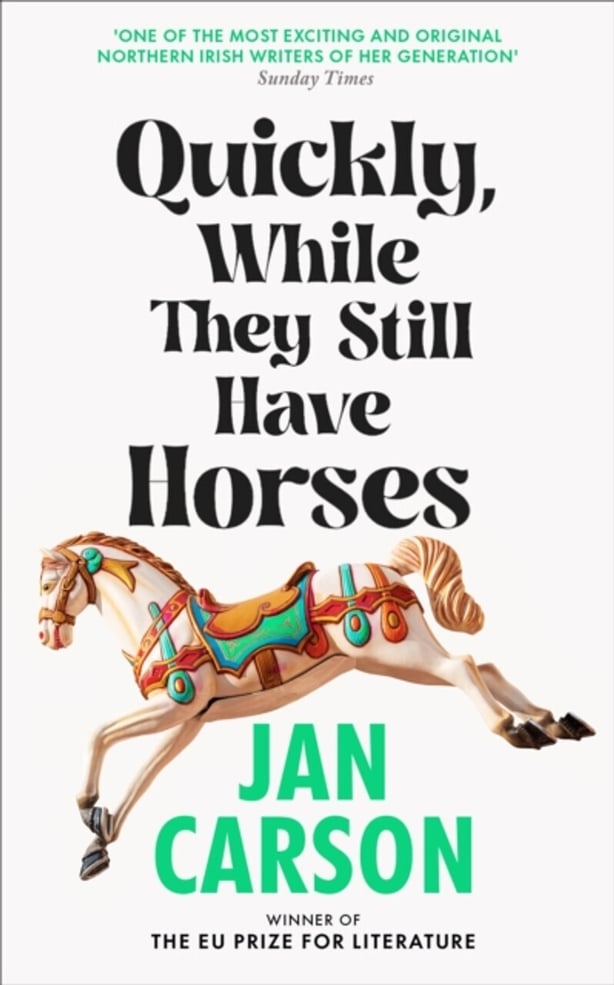In 1973, Gabriel García Márquez told The Atlantic: "In Mexico, surrealism runs through the streets… Surrealism comes from the reality of Latin America." By this he meant that the magical realism with which he and his contemporaries had been tagged—Allende, Borges, Fuentes—was an imaginative outworking of real things which had happened and not, as was often supposed, some fantasy played out against the modern or banal. This was an important distinction because it politicised that which up to then had been misunderstood by the English speaking world as baroque posturing.
In the decades since, many writers have internalised that important message from Marquez and made their own names ploughing that same rich furrow. Jan Carson is one of such writer… or so she would have you believe. For as her new short story collection Quickly, While They Still Have Horses demonstrates, she is not someone so easily pinned down by considerations about genre.
The opening story A Certain Degree of Ownership is short, dark, brutal and wicked. Echoing JD Salinger’s infamous shocker A Perfect Day for Bananafish, Carson masterfully lulls her readers into a false sense of security before delivering the knockout blow with devastating impact. We are given a day at the beach, a laconic narrator half-musing on her marriage, a young family disturbing the narrator’s ambiguous tranquility, before the final sudden ratcheting of tension that would make all but Alfred Hitchcock wince.
In Trouble the Water Carson tows the line between absurdity and ordinariness, between comedy and tragedy with the seasoned expertise of someone in complete control of their craft. The story follows a group of elderly women from East Belfast who catch wind of a miracle being performed down at their local swimming pool. Hoping for spiritual intervention into their troubled lives, the women’s friendship slowly starts to fracture as each of them compete for divine reward. "She’d done her best to help Bill," Carson writes. "Or had she? Perhaps some selfish part of her had wanted the miracle for herself. Her body had rushed ahead of her good intentions, all fourteen and a half stone of it."
The writing here is often reminiscent of Lorrie Moore or George Saunders, though Carson’s deployment of high register comedy over the devastating machinations of everyday life has a flavour all its own. To tag Quickly... as magical realism—as people have been wont to do with Carson’s writing in the past—is to miss the point. There is no clear genre at play here other than good storytelling. Magical realism is too often grasped at by critics who fail to understand the imaginative thrust of an individual author populating their own world with individual characteristics. Spaces full of mystery and colour and compassion sourced from the strangest of places, as in life itself, which have a tendency to confuse anyone not paying full attention to the craft. Carson’s new collection is a beautiful reminder that even the smallest of worlds can be filled with weirdness. And what may at first read like heightened displacement is merely the most accurate reflection of what it feels like to be alive.
Here, realism abounds in its purest form; characters who stand in—not as political ciphers or tragicomic archetypes—but as genuine people with genuine oddball quirks.

Nor should any of this be mistaken for mere whimsy. The binding force at the centre of Quickly, While They Still Have Horses is Carson’s deep affinity for place and the curiously disordering effect that the concept of home sometimes engenders. Carson’s characters are as sharp and acerbic in their strangeness as they are funny or extraordinary.
The northern landscape she depicts is as steeped in the lurking potential for violence as anything by her namesake, Ciaran Carson. Stories like Grand So can’t help but call to mind the feverish noir of a poem like Turn again from the elder Carson’s 1989 collection Belfast Confetti: "When someone asks me where I live, I remember where I used to live. / Someone asks me for directions, and I think again." Jan’s, too, is a voice to cherish; one which continues to weave a bright and colourful thread through the patchwork quilt of modern Irish writing.
Quickly, While They Still Have Horses is published by Transworld.


